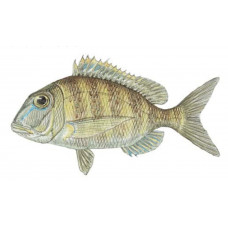Latin name
Calamus bajonado
Other names
Porgy; Spanish: pluma bajonado.
Identification
The body is elongated, tall and strongly compressed from the sides. The high, rounded forehead gives the body the characteristic profile typical of the genus. The head is large, and the eyes are set high. The mouth is small, horizontal, and the front teeth on both jaws are conical, fang-like. On the sides of the jaws are chewing teeth, arranged in three rows on the upper jaw and two on the lower. Yellowish-brown, with an almost metallic sheen, it may be mottled with dusky spots or almost monochromatic, depending on the bottom over which it swims. Some individuals have a grayish hue. Coloration of the body of individuals living on the ground with an admixture of sand or shells is lighter. Above each eye is a blue stripe, sometimes the body is weak blue slit longitudinal strips. The caudal fin is crescent-shaped.
Distribution
It lives along the Atlantic coast of the United States, from the Gulf of Maine to the Straits of Florida, including the waters of Bermuda, in the Gulf of Mexico and the Caribbean Sea, in the waters of the Antilles, off the coasts of Venezuela, Guyana, Suriname, Guyana, and Brazil (to Puerto Rico area). This fish is most abundant in the West Indies.
Habitat
Sea-bottom shelf fish, inhabiting predominantly at depths up to 100 m. Catch has also been recorded at a depth of 273 m. It lives among reefs over rocky, coral, shell and sandy bottom. Juveniles stay at shallower depths.
Size
Length up to 70 cm, weight up to 8.5 kg, age limit 11 years. This species, one of the largest among porgies, usually reaches a length of 20 inches, but can reach a length of 26 inches and a weight of 23 pounds. A specimen weighing 23 pounds 4 ounces is considered a world record in tackle. Females become sexually mature at 30-42 cm in length, weighing 1-2 kg at 4-5 years of age.
Life history and Behavior
No information
Food and feeding habits
The diet consists of sea urchins, crabs, and mollusks. Small flocks can often be seen feeding near the shore. It feeds on worms, bivalves and gastropods, squids, cuttlefish, decapods and other crustaceans, echinoderms and fish.
Reproduction
It spawns off the Atlantic coast of the United States in July and August, and in the Gulf of Mexico and Campeche Bank (northwest coast of the Yucatán Peninsula) in March and June. This fish is a hermaphrodite, with some females turning into males as they age.
| Classification | |
| Phylum | Chordata |
| Class | Actinopterygii |
| Squad | Perciformes |
| Family | Sparidae |
| Genus | Calamus |
| Species | C. bajonado |
| Features | |
| Conservation status | Least Concern |
| Habitat | Pelagic |
| Life span, years | 11 |
| Maximum body weight, kg | 8.5 |
| Maximum length, cm | 76 |
| Sailing speed, m/s | No information |
| Threat to people | Edible |
| Way of eating | Predator |




